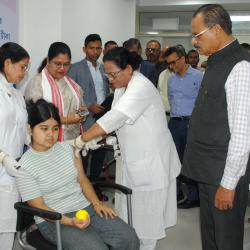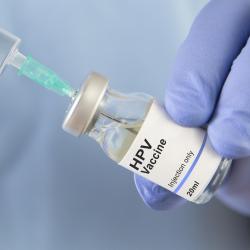A 10-days fast (16 - 25 June 2008) demanding the release of Dr Binayak Sen began today in India, Pakistan, Thailand, US and UK. More than 100 organizations have endorsed this fast and campaign demanding justice for Dr Sen worldwide.
Twenty-two Nobel laureates from around the world had earlier appealed to the Indian government to allow Dr Binayak Sen to receive the 2008 Jonathan Mann Award for Global Health and Human Rights in person at the end of May 2008. But Indian government denied the permission and Dr Sen's wife received the coveted award on his behalf.
Dr Binayak Sen of Raipur, Chhattisgarh, India, who has helped establish a hospital serving poor mine workers in the region, founded a health and human rights organization that supports community health workers in 20 villages, and is the general secretary of the People's Union for Civil Liberties (PUCL), has been imprisoned in Raipur for more than a year now without trial as a result of allegations that he violated state antiterrorism laws. Not only Dr Sen denies committing any crime, but his lifetime contribution to strengthen democracy and fight for the most underserved communities defies such accusations.
This 10-days fast is being organized at Raipur in Chhattisgarh, where Dr Sen is imprisoned, along with in other Indian states and other countries too, to express solidarity with Dr Binayak Sen, Ajay T G (filmmaker) -- both are members of the PUCL, and many others detained under the draconian Chhattisgarh Special Public Security Act (CSPSA) 2005, and the Unlawful Activities Prevention Act (UAPA) 1967, amended in 2004.
These draconian laws sanction the violation of due process by the state, and thus contravene internationally accepted norms of jurisprudence as well as democratic governance. As Senior Advocate K G Kannabiran, National President of PUCL, India, argues in his letter to the National Human Rights Commission (NHRC), the CSPSA and UAPA operate by criminalizing the very performance of civil liberties activities, and culpability is decided upon not by direct proof, but through guilt by association.
The PUCL-Chhattisgarh Unit, with Dr. Binayak Sen's active leadership as its General Secretary, had exposed the government sponsored so-called campaign Salwa-Judum in Chhattisgarh which legitimizes extra-constitutional violence and pits adivasis against adivasis.
The Fast is to ensure that human rights of marginalized people are not trampled upon and human rights defenders continue to work fearlessly. The Fast will end on 25th June, the day Emergency Rule in India was declared in 1975, followed by a National Convention on Repressive Laws & Human Rights on 25th & 26th June 2008 at Raipur.
Twenty-two Nobel laureates from around the world had earlier appealed to the Indian government to allow Dr Binayak Sen to receive the 2008 Jonathan Mann Award for Global Health and Human Rights in person at the end of May 2008. But Indian government denied the permission and Dr Sen's wife received the coveted award on his behalf.
Dr Binayak Sen of Raipur, Chhattisgarh, India, who has helped establish a hospital serving poor mine workers in the region, founded a health and human rights organization that supports community health workers in 20 villages, and is the general secretary of the People's Union for Civil Liberties (PUCL), has been imprisoned in Raipur for more than a year now without trial as a result of allegations that he violated state antiterrorism laws. Not only Dr Sen denies committing any crime, but his lifetime contribution to strengthen democracy and fight for the most underserved communities defies such accusations.
This 10-days fast is being organized at Raipur in Chhattisgarh, where Dr Sen is imprisoned, along with in other Indian states and other countries too, to express solidarity with Dr Binayak Sen, Ajay T G (filmmaker) -- both are members of the PUCL, and many others detained under the draconian Chhattisgarh Special Public Security Act (CSPSA) 2005, and the Unlawful Activities Prevention Act (UAPA) 1967, amended in 2004.
These draconian laws sanction the violation of due process by the state, and thus contravene internationally accepted norms of jurisprudence as well as democratic governance. As Senior Advocate K G Kannabiran, National President of PUCL, India, argues in his letter to the National Human Rights Commission (NHRC), the CSPSA and UAPA operate by criminalizing the very performance of civil liberties activities, and culpability is decided upon not by direct proof, but through guilt by association.
The PUCL-Chhattisgarh Unit, with Dr. Binayak Sen's active leadership as its General Secretary, had exposed the government sponsored so-called campaign Salwa-Judum in Chhattisgarh which legitimizes extra-constitutional violence and pits adivasis against adivasis.
The Fast is to ensure that human rights of marginalized people are not trampled upon and human rights defenders continue to work fearlessly. The Fast will end on 25th June, the day Emergency Rule in India was declared in 1975, followed by a National Convention on Repressive Laws & Human Rights on 25th & 26th June 2008 at Raipur.
- 7802 reads










Add new comment